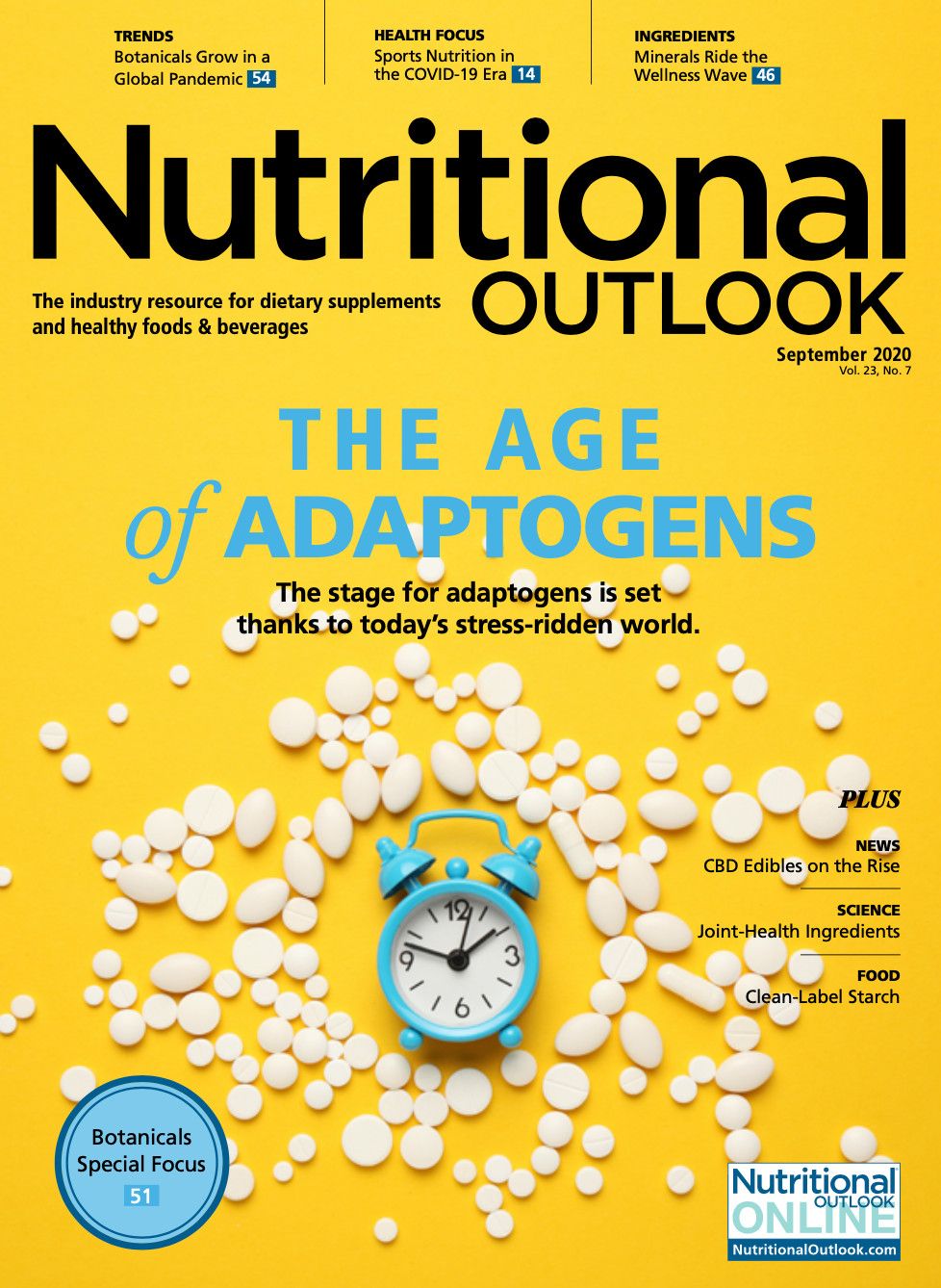“Adapt, or die.” It’s harsh advice, but it’s been an underlying rule of evolution ever since the process got rolling—which means pretty-much forever.
And as we find ourselves half a year into a disorienting new reality living with the COVID-19 pandemic, we’re witnessing our capacity to adapt being tested in ways we never imagined—and generating profound mental and physical stress as a result.
Which is why we may also be witnessing the dawn of the age of adaptogens—plant-based ingredients that purportedly help our bodies adapt to the stresses of trying times, including everyday life.
And if you’re still fuzzy on adaptogens, you’re not alone. As Stephanie Mattucci, associate director, food science, Mintel (Chicago), notes, “Most U.S. consumers aren’t yet familiar with adaptogens, with only 4% currently consuming functional foods and drinks that contain them.”
But those numbers may be ripe for a shift. “Consumers are seeking ways to relax and relieve stress and anxiety across their lives,” Mattucci says. If brands can deliver science-backed ingredients in palatable packages, the adaptogen era may be just the change of pace we need.
Adaptowhat?
Writing in a May 2019 opinion piece for Euromonitor International titled “Adaptogens and Functional Relaxation Beverages,” Howard Telford, the market-research firm’s head of soft drinks, notes that most ingredients currently marketed as adaptogens trace their roots back to Ayurveda and traditional Chinese medicine—“although the term adaptogen itself originated in the twentieth century,” he notes.
And while neither industry, academia, nor the health-and-wellness community has established an agreed-upon formal definition, Telford, like many others, describes adaptogens as “naturally occurring, nontoxic, plant-based ingredients that help promote stress reduction and physiological balance.”
The Body’s Thermostat
How they do so awaits definitive elucidation—as do further details about effective dosing, measurable effects, and long-term benefits. But for now, says Shanais Pelka, research and development manager for superfoods company Organifi (San Diego, CA), we can think of adaptogens “as sort of like a thermostat.”
Consider: When your living-room thermostat senses that the temperature’s too cold, it kicks on the heat to bring the temperature up; when it senses things getting too hot, it reverses course and cools the room back down. “The beautiful thing about an adaptogen,” Pelka explains, “is that, like a thermostat, it can actually decrease anxiety and calm you even while increasing energy.”
The secret, apparently, lies in the adrenals. “Adaptogens support our adrenal glands behind the scenes to ensure a balanced, healthy, functioning body,” Pelka says. These endocrine organs participate in everything from regulating the sleep/wake cycle and suppressing inflammation to keeping blood sugar in check and secreting neurotransmitter hormones like epinephrine, norepinephrine, and dopamine.
“These hormones,” Pelka goes on, “generate the primitive stress response that helps keep us alive in moments of trauma or danger.” Yet when our adrenal glands fatigue—whether from poor diet; physical, emotional, or environmental stress; or even the occasional all-nighter—“we may not be able to make the required hormones and neurotransmitters our bodies need.”
These downstream hormonal effects of continual stress can disturb sleep, memory, emotions—even immunity. And that, says Pelka, is where adaptogens provide support. “The effects may be subtle at first,” she notes, “but just wait a couple weeks and you notice real changes in your body.”
Stress Positions
Many consumers would likely welcome those changes now. A 2017 Euromonitor International online survey found 70% of respondents claiming that capping daily stress levels was an “important health objective.” And that was back in 2017.
According to Veronica Eckl, associate data product manager, SPINS (Chicago), that bodes well for adaptogenic ingredients. “High-stress lifestyles and environments, as well as a move toward greater self-care, are definitely driving interest in adaptogens,” she says.
By nourishing an overstressed endocrine system, Eckl contends, adaptogens “nourish the entire body rather than treat a singular symptom.” And with awareness of the relationship between endocrine function and stress growing, she believes, the way forward for adaptogens is up.
Up-and-Coming Adaptogens
Ginseng
“In the current wave of natural-product innovation, ginseng—both Asian and American varieties—remains prevalent and has been a popular ingredient globally,” Euromonitor’s Howard Telford notes. In fact, he goes so far as to crown ginseng “the most popular adaptogen overall.”
Ashwagandha
Calling ashwagandha a “prized herb in Ayurveda,” SPINS’ Veronica Eckl notes that ashwagandha is valued for its apparent role in supporting youth, fertility, and vitality, as well as immunity. “Clinical studies have also suggested that it could play a part in calming the nervous system.”
Tulsi
Tulsi, or holy basil, is another adaptogenic herb in the Ayurvedic pharmacopeia. “Holy basil has traditionally been used for bronchial and cardiovascular support, and animal studies in the last decade or so have shown it as a promising anti-stress agent, containing possible cortisol-reducing compounds,” Eckl says.
Maca
Maca, an indigenous Andean botanical, has claimed a measure of fame as a superfood, but Eckl notes that its history supporting hormonal health and energy levels dates back well before its current renown. “This herb is also a powerhouse of vitamins, minerals, and other nutrients,” she says. “It can easily be included in drink mixes or smoothies.”
Mushrooms Galore
And mushrooms—from maitake and shiitake to chaga, reishi, and beyond—are attracting attention as adaptogens. Practitioners of traditional Chinese medicine have administered both the fruiting bodies and mycelia of reishi mushrooms for more than two millennia thanks to their “impressive list of medicinal qualities,” Eckl says. She says reishi is even known as “the mushroom of immortality.”
Tonics made with reishi revitalize energy, Eckl notes, while reishi’s polysaccharides and beta-glucans support immune health. “There’s even been promising preliminary research showing that reishi can help promote sleep and decrease stress,” she says.
Multigenerational Appeal
Mintel’s Mattucci agrees, adding that younger consumers could give the category a concerted boost. “While stress is a universal phenomenon, today’s youth are more open about acknowledging stress and anxiety than previous generations were,” she notes. “Gen Z—born between 1995 and 2007—is now and will continue to be a key audience for formulations that help relieve stress and anxiety.”
Yet adaptogens have something for everyone. Because stress exacerbates the effects of aging, for example, “Adaptogens are making more appearances in skincare and beauty products like serums, moisturizers, and masks as an extra boost, as well as to fight inflammation,” SPINS’ Eckl points out. She believes the ingredients “hit the same note as the self-care revolution.”
And given that stressors like COVID-19, social unrest, and a looming economic downturn show no signs of relenting, “Demand for stress relief will only increase in 2020,” Mattucci predicts. “Adaptogens that offer a dual benefit of stress reduction and immune support have the potential to thrive in a post-COVID world,” she adds, “especially as stress takes a toll on the immune system, leaving us more susceptible to illness.”
Still Adapting
Some product developers are already signing on. “While still niche in foods, drinks, and supplements,” Mattucci says, “adaptogens like holy basil, ashwagandha, maca, and several types of ginseng have the potential to grow, and are already showing up in functional foods and drinks designed for stress relief.”
But obstacles still block adaptogens’ route to the mainstream.
Awareness of and familiarity with the ingredients “is still very low in most markets,” says Joana Maricato, market research manager, New Nutrition Business (London). Consumers in the know tend to be early adopters and “highly health-oriented shoppers who are always looking for the latest developments in health and wellness and are willing to pay a premium for them,” she says.
A dearth of human clinical trials will pose another hurdle. As Eckl says, “While adaptogens have been used in traditional medicines for thousands of years, the exact mechanism of many of these plants is unknown, and most studies are based on animal trials, as in the case of holy basil and other adaptogens.”
And because consumers need time and consistent use to see results, the sense that the ingredients aren’t working may also discourage repeat purchase. “It can be difficult to feel a ‘destressing’ effect, and this can demotivate consumers,” Maricato says.
Eckl agrees. “Even coffees, tea mixes, and other drink preparations containing adaptogens may not create an immediate boost of energy or vitality and are best used over time,” she notes.
Special Delivery
Another potential problem: Many adaptogens don’t taste good. But, says Eckl, “Some do have a unique flavor profile that manufacturers can capitalize on.” Bitterness, for instance, may not stand out in a tea or dark-chocolate drink.
In fact, she continues, “Tea, matcha, and golden milk mixes have been formulated with adaptogenic herbs,” while protein supplements and electrolyte and functional beverages also make good candidates for what she calls “an added boost of sustainable adaptogenic energy.”
Mattucci believes that adaptogens will gain the most traction when delivered in products “that consumers already choose to help them relax and reduce stress, such as snacks and beverages.” But she also sees a home for them in sports nutrition, “as many consumers who exercise are doing so to relieve stress.”
An intriguing angle for future formulation might be to capitalize on the connection that adaptogens and brain-boosting nootropics have with sports nutrition and performance, Maricato suggests. “Many ingredients, like caffeine and taurine, are already associated with heightening mental and physical performance,” she notes, “while those connected to the relaxation and destressing effects of adaptogens are also needed for optimal performance.”
And as far as ingredient choice goes, Eckl points out that while single herbs “work well for targeted support, herbal blends can be as potent, if not more so, than the individual herbs they contain.” For example, reishi plus holy basil help support sleep, she says, while cacao “could complement the cognitive properties of the other herbs” in an adaptogenic product.
Euromonitor’s Telford advises keeping adaptogens “whole.” “Consumers demonstrate a strong preference for simple, ‘whole-food’ solutions instead of artificial, highly processed, or unfamiliar ingredients,” he says. “The rise of adaptogens in foods and beverages is part of a much broader push toward whole foods, plants, and beverages as supplement solutions, away from pills and less palatable capsules.”



























